Sondrio
Sondrio (Italian: [ˈsondrjo] ⓘ; Lombard: Sùndri; Romansh: Sunder; archaic German: Sünders or Sonders; Latin: Sundrium) is an Italian city and comune and Provincial Capital located in the heart of the Valtellina. As of 2012, Sondrio counts approximately 21,876 inhabitants (2015) and it is the administrative centre for the province of Sondrio. In 2007, Sondrio was given the Alpine Town of the Year award.
Sondrio
| |
|---|---|
| Città di Sondrio | |
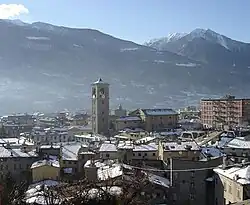 Panoramic view Sondrio | |
.svg.png.webp) Flag 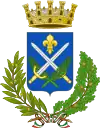 Coat of arms | |
.svg.png.webp) Sondrio within the Province of Sondrio | |
Location of Sondrio | |
 Sondrio Location of Sondrio in Italy 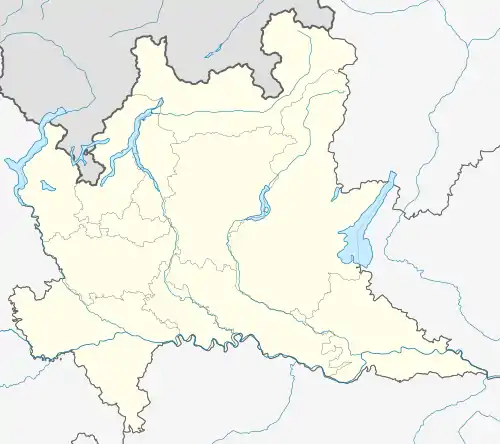 Sondrio Sondrio (Lombardy) | |
| Coordinates: 46°10′N 09°52′E | |
| Country | Italy |
| Region | Lombardy |
| Province | Sondrio (SO) |
| Frazioni | Arquino, Colda, Gualtieri, Ligari, Moroni, Mossini, Ponchiera, Sant'Anna, Sassella, Triangia, Triasso |
| Government | |
| • Mayor | Marco Scaramellini (Lega Nord) |
| Area | |
| • Total | 20.88 km2 (8.06 sq mi) |
| Elevation | 360 m (1,180 ft) |
| Population (30 September 2017)[2] | |
| • Total | 21,588 |
| • Density | 1,000/km2 (2,700/sq mi) |
| Demonym | Sondriesi |
| Time zone | UTC+1 (CET) |
| • Summer (DST) | UTC+2 (CEST) |
| Postal code | 23100 |
| Dialing code | 0342 |
| Patron saint | Sts. Gervasius and Protasius |
| Saint day | June 19 |
| Website | Official website |
History
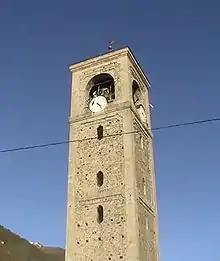
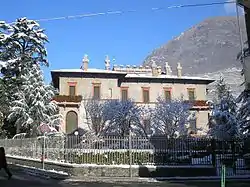
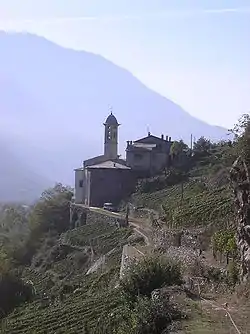
Formerly an Ancient Roman military camp, today's Sondrio was founded by the Lombards: in their language Sundrium meant "Exclusive property", referring to the status of free men (arimanni) of the holders of the city and the surrounding land.
After the fall of the Lombard Kingdom in Italy, Sondrio became part of the Holy Roman Empire. The Capitanei of Vizzola, who controlled much of the Valtellina, had it in 1040 from the emperor Henry II. From 1310 to 1335 the city was involved in the war between the Guelph and Ghibelline factions of the nearby Como, and its war against Milan. After having resisted several attacks by the Comaschi, in 1335 Sondrio and Valtellina became part of the Visconti Milanese dominions.
From the second half of the 16th century to the end of the 18th century, Sondrio was governed by the Tre Leghe Grigie ("Three Grey Leagues") of the Grisons, as the capital city of Valtellina. After the Reformation, Sondrio was the centre of heavy struggles between the Catholic Valtellinesi and the Protestant Grisons. In 1620 the citizens, led by Giacomo Robustelli, killed 180 Protestants and declared the independence of the Valtellina.
After the Napoleonic parenthesis, in which it became part of the Cisalpine Republic (later Kingdom of Italy), Sondrio with the Valtellina was annexed to the Austrian Kingdom of Lombardy–Venetia, and fought gallantly for its independence.
Geography
The town is located in the middle of the province, and borders with the municipalities of Albosaggia, Caiolo, Castione Andevenno, Faedo Valtellino, Montagna in Valtellina, Spriana and Torre di Santa Maria. Its hamlets (frazioni) are Arquino, Colda, Gualtieri, Ligari, Moroni, Mossini, Ponchiera, Sant'Anna, Sassella, Triangia and Triasso.
Government
Economy
The territory of Sondrio has numerous vineyards; wines produced include the Sassella and Grumello. Wine represents one of the main resources of this region, together with tourism, especially in winter.
Another important piece of Sondrio's economy is its banking industry, with the Banca Popolare di Sondrio[3] and the Credito Valtellinese[4] both headquartered in Sondrio and listed on the Milan Stock Exchange.
Main sights
The heart of Sondrio is its central Garibaldi Square. Not far from it is the Palazzo Sassi, home of the Art and History Museum of Valtellina. In a dominant position, near the ancient road to the Valmalenco, linking the town to Switzerland, stands the Masegra Castle, housing the Historical Museum of the Grisons Domination.
The church of Santi Gervasio e Protasio rebuilt in Neoclassical-style in 1838, was built in the 12th century as a Romanesque pieve and collegiate church. Other sights include the Torre Ligariana, once the collegiate's bell tower, and the Palazzo Pretorio, once the seat of the Grisons government.
Across the railway in direction of Milan there is the ancient Church of Maria della Sassella,[5] which the local tradition dates back to the 10th century.[6][7] In March 2021 the Roman Catholic Diocese of Como declared the church to be a diocesan Marian sanctuary.[8]
People
- Giovanni Pietro Ligario (1686–1748), painter
- Antonio Caimi (1814–1878), painter
- Enrico Sertoli (1842–1910), physiologist and histologist
- Antonio Carini (1872–1950), physician, bacteriologist and professor
- Primo H. Zopatti (1878-1934), entrepreneur America, Zopatti Bros., Dorchester.
- Pier Luigi Nervi (1891–1979), engineer
- Valerio Ricetti (1898—1952), Italian-Australian hermit
- Gianni Celati (1937–2022), writer, translator and literary critic
- Sophia Zopatti Lewis (b.1941), Olympic dressage hunter/jumper Rome 1960
- Giulio Tremonti (b. 1947), politician
- Benedetto Della Vedova (b. 1962), politician
- Raffaella "Raffy" Rossi (b. 1974), ski mountaineer and skyrunner
- Luca Colombo (b. 1984), football player
- Matteo D'Alessandro (b. 1989), football player
- Robert Antonioli (b. 1990), ski mountaineer
- Michele Boscacci (b. 1990), ski mountaineer
- Arianna Fontana (b. 1990), short track speed skater
- Lorenzo Passerini (b. 1991), conductor
Twin towns – sister cities
 Radovljica, Slovenia
Radovljica, Slovenia São Mateus, Brazil
São Mateus, Brazil Sindelfingen, Germany
Sindelfingen, Germany
Sports
Sondrio Calcio is the football club of the city and currently plays in Serie D.
See also
References
- "Superficie di Comuni Province e Regioni italiane al 9 ottobre 2011". Italian National Institute of Statistics. Retrieved 16 March 2019.
- Population data from Istat
- BPS – Banca Popolare di Sondrio
- Gruppo bancario Credito Valtellinese
- "Santuario della Beata Vergine della Sassella". lombardiabeniculturali.it (in Italian).
- Bormetti, FRancesca. "Santuario della Madonna della Sassella a Sondrio" (in Italian). Retrieved May 15, 2021.
- "Local tour of the Marian sancturary" (PDF) (in Italian). Archived (PDF) from the original on May 15, 2021 – via YouTube.
{{cite web}}: External link in|via= - "Il decreto di elevazione ed il testo dell'omelia. La chiesa di Santa Maria della Sassella a Sondrio elevata a Santuario diocesano" (in Italian). March 25, 2021.
- "Città gemellate". comune.sondrio.it (in Italian). Sondrio. Retrieved 2020-11-18.